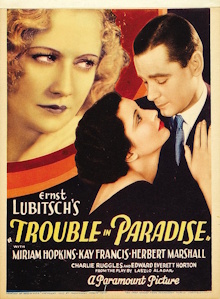With its ostentatious displays of wealth and portrayal of the high life, this is another film that loudly announces itself as escapism amidst the Great Depression. The twist here is that it’s no rags to riches story but about thieves who pretend to be rich in order to rob them. It was made by Ernst Lubitsch who truly does have an artful touch in directing these things so it’s great fun for a little while. Still, the only question towards the end is which of the two female leads the male hero will choose and that’s the full extent of how sophisticated the film is.
In Venice, a handsome baron meets a beautiful countess for dinner. But both are fake and know it. The man is Gaston Monescu, a notorious thief, and the woman is Lily, a skilled pickpocket. They declare their love for each other and team up. Meanwhile in Paris, Mariette Colet is an heiress with more money than sense. At the opera one evening with two men who are wooing her, she loses a fantastically expensive diamond-encrusted purse. Naturally it is Gaston who has stolen it. Colet posts an advertisement offering a reward for its return and Gaston responds under a fake identity. He charms her into hiring him as her personal secretary to handle her financial affairs, moving into her mansion. Lily in turn poses as his assistant. They plan to rob Colet and the people around her are suspicious of Gaston. Under these circumstances, Colet of course falls in love with Gaston so the only question that remains is whether he in turn will choose her over Lily.
This is a silly, light-hearted romp so it’s best not to take it too seriously, but there is an undeniable energy and charm in Lubitsch’s direction. We can see it from the very beginning when it sets the scene in romantic Venice, only to immediately show a gondola being used to haul garbage. The juxtaposition of low and high is indeed the theme of the film. Not only does it offer a glimpse of a dazzlingly expensive lifestyle, it also insinuates at every turn that these rich people have done nothing to deserve their fabulous wealth. Colet has inherited all of the money and can barely keep track of her jewelry and cash. Even so, that doesn’t mean that she is overly generous with her money. As Lily points out, the 125,000 francs purse is nothing to Colet, yet she offers Lily a 50 franc a month raise so that Gaston has more free time to spend with her. Gaston and Lily may indeed be criminals but fleecing these rich people only feels like social justice.
One interesting historical artifact in this film is that there is actually some sexual tension between Gaston and Colet. When he lodges in a room in her house, it’s clear that she hopes he will slip in her own bedroom one night. This was enough to get the film rejected from being reissued after the moral codes were enforced. Unfortunately Gaston doesn’t share the same kind of chemistry with Lily as their own relationship feels more like being partners in crime. I’m particularly annoyed that their feats of thievery are never depicted. It just uses the old-fashioned trick of one person patting their pockets to show that they’re missing something and the other one pulling it out with a flourish. Anyway this is a rather short film and it does its job well enough to provide entertainment for the masses in the 1930s. It doesn’t have that much to offer to modern audiences unless you have a particular fascination for the period.
